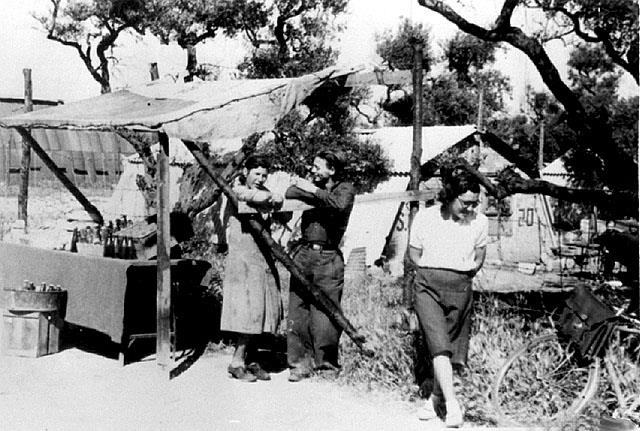
A black market shop, Palese camp, Italy, 1947.
The Oster Visual Documentation Center, ANU - Museum of the Jewish People, courtesy of Stephan Cohen.
Bari
(Place)Bari
Adriatic port in southern Italy.
Bari was one of the flourishing Jewish centers of Apulia which according to tradition were founded by captives brought to Italy by Titus. However, no inscriptions have survived to show that the community may be traced back to the Roman period, as is the case in neighboring towns. The community in Bari evidently rose to importance somewhat later. In the ninth century the miracle-worker Aaron of Baghdad visited Bari.
The names of scholars who taught at the local rabbinical academy in the tenth and eleventh centuries are recorded, including Moses Calfo, who is mentioned in the Arukh of Nathan Ben Jehiel. Legend talks of "Four Rabbis," who sailed from Bari in 972, were captured at sea by Saracen raiders, and sold into slavery in Spain and North Africa; after being ransomed, they founded famous Talmudic academies. The legend at least indicates that Bari was known as a center of Talmudic learning. This is confirmed by the adage cited forth the law and the word of the lord from Otranto" (an archbishop of Bari (d. 1078), actually became converted to Judaism.
The Jews of Bari underwent a number of vicissitudes. They were included in the edicts of forced conversion issued by the Byzantine emperors in the ninth and tenth centuries. In about 932, the Jewish quarter was destroyed by mob violence and several Jews were killed. Between 1068 and 1465 the Jews in Bari suffered from the rival claims of the king and the archbishop on taxes levied on the Jews in the city. The Jews in Bari were also victims of the campaign to convert Jews to Christianity initiated by Charles of Anjou in 1290; in 1294, 72 families were forced to adopt Christianity, but continued to live in Bari as Neofiti.
There followed a century and a half of tranquility until the Jewish quarter was again attacked in 1463; in 1495 Jewish property worth 10,000 ducats was pillaged. The expulsion of the Jews from the kingdom of Naples in 1510-- readmitted in 1520 and was finally forced to leave in 1540-- 41. The Via Della Sinagoga in Bari remains to attest the existence of the former community, and several early medieval tombstones are in the Museo Provinciale. Jewish communal life was briefly resumed during World War II, when in 1943 many Jews from other parts of Italy and from Yugoslavia took refuge in Bari from Nazi-occupied territories. Toward the end of the war a refugee camp was established at Bari. The beginning of the "illegal" immigration to Palestine movement in Italy was situated in the area around Bari. During this period Jewish soldiers, mainly from Palestine, were active in aiding and organizing the refugees.